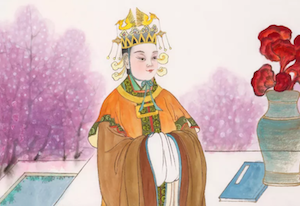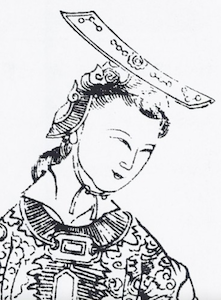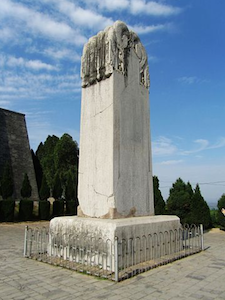
Wu Zetian was the first, and only, female Emperor of China and ruled for fifteen years. Her reign was highly successful, as she led a period of prosperity, growth, and development in China.
Wu was born in 624 AD in Guangyuan, China. Little is known about her childhood, but she was reported to have been a very stubborn child, and took no interest in fulfilling women’s traditional duties and responsibilities. Instead, the future emperor was interested in politics, which her father encouraged. He allowed her to learn how to read and write, a privilege uncommon for young women at the time.
At the age of 14, Wu was invited to work in the Emperor’s palace by the Emperor himself, Tai Zong, after he visited her home and was impressed by her beauty and charm. In Zong’s palace, she was a low-ranking concubine. However, she made her way through the social ranks, and her bold political interest earned her a secretarial position.
After Zong died, Wu was sent to become a Buddhist nun at the age of 31. According to Chinese law, an Emperor's concubine had to become a nun and remain celibate when he passed. However, Gao Zong, Tai Zong’s son and the new emperor of China, invited Wu back to the palace, violating traditional rules.
Gao Zong was very taken with Wu, making her his concubine, and fell in love with her, despite being married. Wu fostered good relationships with the Emperor’s other concubines, and used those relationships to gather information and spy on the Emperor’s wife. Wu then bore one of Zong’s sons. Shortly after birth, the infant was strangled. The Emperor’s wife, Lady Wang, was rumored to have done it out of jealousy. However, there is significant doubt regarding who actually committed the crime. Some later, removed accounts say that Wu did it, and framed Wang to depose of her. Wang was put on trial and convicted, since she had no alibi. Another explanation is that Wu was accused of this terrible crime by historians, in an attempt to demonize her and give evidence as to why female rulers were unfit.

Regardless of who actually killed Wu’s son, Wang was banished from the palace, and Wu became the new Emperor of China. In this position, she assumed high political power and made many significant decisions on behalf of her husband. As Emperor, she took charge of all of the affairs of state, and was highly involved in policy-making. She instituted a successful 12-point program of reform. The resulting reforms included an increase in agricultural production, reduced taxes, and decreased military operations. They also allowed criticism from citizens for government reform, promoted long-serving worthy officials, and increased salaries. The new reform system was very popular among all social groups.
When Gao Zong died, Wu’s son, Li Xian, took emperorship. He was extremely incompetent at ruling, and Wu took charge of all decisions. She soon deposed Xian, and put her other son, Li Dan, into power. Her intervention caused a great deal of opposition and rebellion in China, as it was seen to be reckless interference in state affairs that did not concern her. Once the rebellion was quelled, Wu changed her strategy, and became determined to make herself the Emperor of China.
Wu rallied her followers in a campaign to gain popular support, so she could make herself emperor. In her campaign, she saw to it that the poor and struggling people of China were given financial assistance and punished corrupt officials and fraudulent merchants. Her efforts were successful, and three petitions were filed that requested her to declare herself Emperor. One of these petitions had more than 60,000 names.
Wu was then declared as Emperor of China, making her the first and only female Emperor in all of Chinese history. Wu chose trustworthy, deserving officials for the bureaucracy, and fostered economic development. Under her rule, the population almost doubled, growing from 3.8 million households to 6.15 million households. She also maintained good foreign relationships. The few wars that China had during her reign were all successful, including Victories against Turk, Tu-bo, and Khitan, and expanded China’s influence and power. She also improved the meritocracy by introducing military entrance exams to ensure competence. Furthermore, Wu reopened the Silk Road after it closed, due to the Black Plague in Europe. She improved public education systems, and led agricultural production to an all-time high.

One of the reasons that Wu was successful was because she listened to citizens. She introduced petition boxes, where citizens could submit criticisms, so the Empire could improve and grow. This commitment to hearing citizens’ voices is what made her such an incredible ruler.
Another piece of evidence that Wu’s rule was significant was her aim to promote the significance of women. In her campaign for emperorship, she sponsored scholars to publish a book of biographies of famous women, including various Empresses, scholars, and the mothers of notable politicians. She also required children to mourn the deaths of both their parents, not just their fathers, which was unusual in such a patriarchal society, and emphasized the value of women in families.
Wu still did have to deal with a great deal of criticism, specifically regarding her gender. Shortly after she took the throne, there was an earthquake in China. Natural disasters were frequently seen as omens in China, so when an earthquake followed the throning of the first female Emperor, many took it as a bad sign. One minister wrote, “A female ruler improperly has occupied a male position, which has inverted and altered the hard and soft, therefore the Earth's emanations are obstructed and separated.” These criticisms were far from unexpected during that time; China largely followed the beliefs of Confucianism, which saw women as inferior to men, and unfit to rule. Wu was seen as an offense to the typical Chinese way of life. Despite these obstacles, Wu was a generally well-liked ruler.
When Wu died in 705 AD, after 15 years of successful leadership, her tomb had no markings, unlike the tombs of every other Emperor in Chinese history. This makes the legacy of China’s only female Emperor a bit of a mystery. However, it is clear that Wu was a wise, clever, and effective leader who overcame many gender barriers to successfully lead China through a period of great prosperity and growth.
Why Did I Choose to Research Article Wu Zetian?
When I was learning about Chinese history, my teacher briefly mentioned that China had a female Emperor. I was fascinated by this, and thought it was strange that I had never heard about her. I found it incredible that during a time of extreme sexism and gender oppression, a woman was able to successfully rule for 15 years. I admire that Zetian had the cleverness and talent to rule over a massive Empire, despite violating the societal norms of her time. I chose to research her because I wanted a more in-depth perspective about what she was able to accomplish as Emperor, and I wanted others to learn more about this incredible, fierce woman.
Works Cited
Custer, Charles. "The Life of Wu Zetian." ThoughtCo, Aug. 28, 2020, thoughtco.com/life-of-wu-zetian-688051.
Dash, Mike. "The Demonization of Empress Wu." Smithsonian Magazine, 10 Aug. 2012, www.smithsonianmag.com/history/the-demonization-of-empress-wu-20743091/. Accessed 19 June 2022.
Mark, Emily. "Wu Zetian." World History Encyclopedia. World History Encyclopedia, 17 Mar 2016. Web. 17 June 2022.
"Wu Ze-Tian." Historic World Leaders, edited by Anne Commire, Gale, 1994. Gale in Context: Biography, link.gale.com/apps/doc/K1616000638/BIC?u=nysl_me_scarshs&sid=bookmark-BIC&xid=f1d94080. Accessed 19 June 2022.
This article was published on 3/22/23